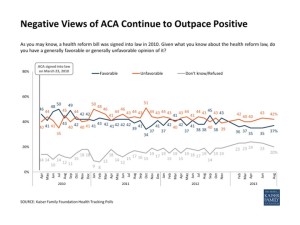 You might see potato and I might see po-tah-to when looking at the Affordable Care Act – health reform — but it’s clear we don’t want to call the whole thing off. (Go to 1:44 seconds in this video to get my drift, thanks to the Gershwin’s).
You might see potato and I might see po-tah-to when looking at the Affordable Care Act – health reform — but it’s clear we don’t want to call the whole thing off. (Go to 1:44 seconds in this video to get my drift, thanks to the Gershwin’s).
I’m talking about the latest August 2013 Kaiser Health Tracking Poll from Kaiser Family Foundation finds a health citizenry suffering ennui or a form of split personality about health reform: while many Americans don’t believe the Affordable Care Act (ACA) will help them, most don’t want Congress to de-fund it, either. Several graphs from the August 2013 KFF poll tell this story of a health populus not so much anti-health reform as much as tired of and under-educated about it.
The first chart shows the 3-year trend on American adults’ views, positive or negative, on the ACA. Favorable marks for health reform have fallen from 46% of Americans feeling good about the ACA in April 2010 down to 37% in August 2013 – a decline of 9 percentage points in just over 3 years, with roughly one month until the launch of the Health Insurance Marketplaces (Exchanges, HIXs).
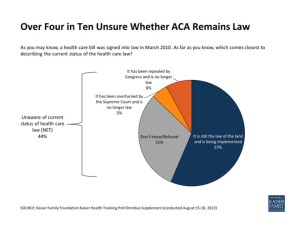
“Negative views outpace positive” for the ACA, KFF concludes. Looking at the first chart, negatives have remained fairly flat around 40% of U.S. adults. But there’s been a growing proportion of people who just don’t know how they feel about the ACA – in August, 20% from 14% in April 2010. This means that the bulk of people who felt good about the ACA in April 2010 have mostly moved into the “don’t know” camp, and not so much the anti-ACA camp.
Part of the “don’t know” issue is that 1 in 4 Americans aren’t so sure the Affordable Care Act is still the law, according to the second chart from the poll. 44% of people overall aren’t sure about the status of the law. With all that uncertainty, it’s no wonder people don’t know what to make of the law, pro- or con-.
Still, over one-third of Americans are looking for information on ACA, as the third chart shows. A majority of people are looking online (via the Internet) for information on the ACA, with 1 in 4 going to news media, 8% to health plans, and 7% to government websites. Doctors, employers and unions are at the bottom of go-to sources of information for the ACA in the eyes of American adults.
But most trusted sources of info on the ACA would be doctors, government agencies, and pharmacists, as the fourth chart attests. Among less-trusted sources for information on health reform are news media, trusted by only 8% of U.S. adults. But as the fourth graph indicates, people are going to news media and friends and family for their ACA info, notwithstanding the fact that they trust health providers and government sources (Federal and State) more.
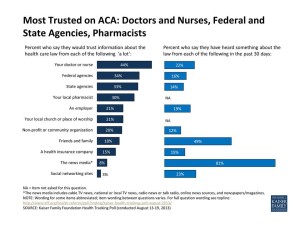
At the end of the day, and even with ambivalence around the ACA, most Americans do not want to see the law de-funded as certain members of Congress have called to do. Last week, Senator Mike Lee of Utah said he believed the effort calling to defund health reform was gaining momentum. But as the fifth chart demonstrates, a majority of Americans opposed defunding the ACA. 36% of Americans say, “defund.”
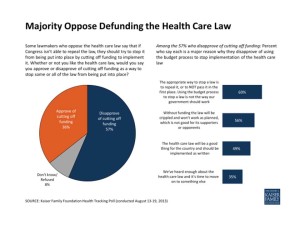
Among the majority of people who say “don’t defund the ACA,” most believe that Congress should repeal a law – not take money away from it – when they disapprove of the policy. Most Americans also believe that if the ACA is defunded at this stage, it would “cripple” the law which wouldn’t be constructive for either those who oppose the law or those who support it.
Health Populi’s Hot Points: At this point in the ACA’s post-passage maturity, the law is on the books and in the midst of implementation. Health Insurance Marketplaces are being built, Navigators trained, and health plans beta-testing their online menus of choice for bronze, silver, gold and platinum health plans for insurance shoppers to compare.
The data in the fourth chart paint an important reality that’s gotten lost on ACA tacticians: that’s the trust issue, where most people still look to the health system, to government, and to pharmacy for information they can trust about health and health insurance issues. That most people are consuming mass media sources for ACA 101 means they’re opting in to receiving that information from the very source they don’t trust. That’s a disconcerting disconnect.
Arm physicians, hospitals, health educators, universities and colleges, and pharmacies, with ACA 101 materials and “health insurance therapy” hand-outs. Create useful apps (and fast!) like the one the state of Colorado did through its Blue Book mobile health initiative to help people in the state assess their health plan options. Younger people use apps, and that’s a key demographic for educating as of 10/1/13, and signing up on 1/1/14.
I’m still a fan, too, of reaching out to health insurance prospects through mass media the way this commercial did for Medicare Open Enrollment in 2010 or the controversial approach that used Andy Griffith to promote the Medicare Part D program. Take a page (web page, or TV ad) out of that playbook, and we’ll see the numbers tick up on ACA literacy, and ACA approval ratings.


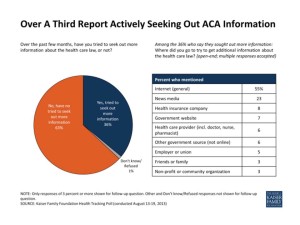


 I am so grateful to Tom Lawry for asking me to pen the foreword for his book, Health Care Nation,
I am so grateful to Tom Lawry for asking me to pen the foreword for his book, Health Care Nation,  I love sharing perspectives on what's shaping the future of health care, and appreciate the opportunity to be collaborating once again with Duke Corporate Education and a global client on 6th May. We'll be addressing some key pillars to consider in scenario planning such as growing consumerism in health care, technology (from AI to telehealth), climate change, and trust -- the key enabler for health engagement or dis-engagement and mis-information. I'm grateful to be affiliated with the corporate education provider
I love sharing perspectives on what's shaping the future of health care, and appreciate the opportunity to be collaborating once again with Duke Corporate Education and a global client on 6th May. We'll be addressing some key pillars to consider in scenario planning such as growing consumerism in health care, technology (from AI to telehealth), climate change, and trust -- the key enabler for health engagement or dis-engagement and mis-information. I'm grateful to be affiliated with the corporate education provider  Thank you FeedSpot for
Thank you FeedSpot for